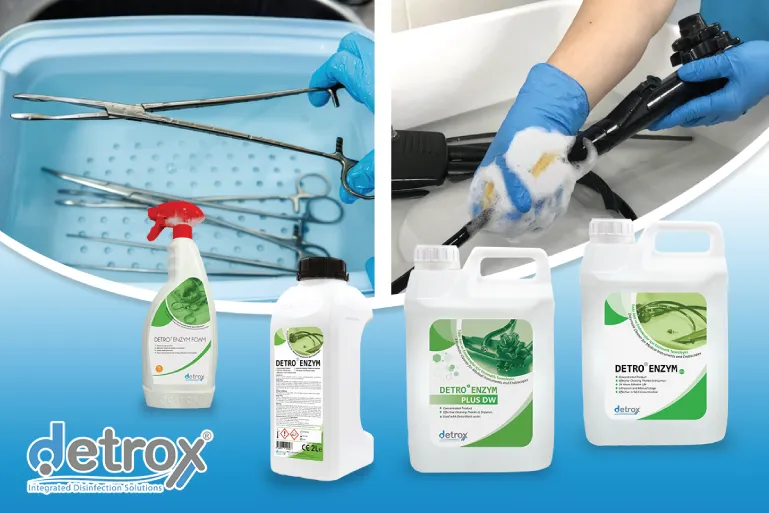What Does Enzymatic Mean? What Is an Enzymatic Cleaner and How Does It Work?
In today’s world, we encounter the term “enzymatic” in various fields ranging from household cleaning products to industrial processes. Enzymatic cleaners are products designed to break down and clean organic materials by harnessing the catalytic effects of natural enzymes. So, what does enzymatic mean and how do enzymatic cleaners work? In this article, we will delve into the concepts of enzymatic and enzymatic cleaners in detail and explore the different application areas of enzymatic cleaners.
What Does Enzymatic Mean?
The term “enzymatic” is related to biological catalysts called enzymes. Enzymes are molecules with a protein structure that accelerate cellular reactions and regulate metabolic processes. The enzymatic concept encompasses the natural catalytic effect of enzymes and finds applications in numerous fields.
What Is an Enzymatic Cleaner?
Enzymatic cleaners are cleaning products that utilize the natural catalytic effect of enzymes to break down and clean organic materials. These cleaners stand out for being more environmentally friendly and biodegradable compared to traditional cleaners. Enzymatic cleaners deliver effective results, especially when it comes to tackling tough stains and contaminants.
The Best Enzymatic Cleaner
Choosing the most suitable enzymatic cleaner from the variety available is important. The best enzymatic cleaner is a product that offers effective performance and user-friendly features. Some important factors to consider when selecting a product are as follows:
- Types of enzymes in the enzymatic cleaner: Different enzymes can be effective in breaking down different organic materials. It’s important to choose products that contain enzymes suitable for the specific contaminants you want to clean.
- Effectiveness and performance: Enzymatic cleaners need to be effective and capable of cleaning tough stains and contaminants efficiently. Paying attention to performance claims on product labels and customer reviews can be helpful.
- Dosage and ease of use: Proper dosing and easy application of enzymatic cleaners are crucial. Opt for products that provide suitable dosing and application methods for different surfaces to ensure practicality.
Definition and Characteristics of Enzymes
Enzymes are biocatalysts with a protein structure. They accelerate biochemical reactions and regulate cellular processes. The fundamental characteristics of enzymes include:
- Protein structure: Enzymes are composed of protein molecules and generally consist of one or more polypeptide chains.
- Active site: The region responsible for the catalytic activity of enzymes is referred to as the “active site.” The active site is where interactions with substrate molecules occur, leading to chemical reactions.
- Substrate specificity: Each enzyme acts specifically on a particular substrate. Substrate specificity is based on the enzyme’s ability to break or form specific chemical bonds.
Enzymatic Reactions and Processes
Enzymatic reactions are biochemical processes catalyzed by enzymes. Enzymes bind to substrate molecules, facilitating the breaking or formation of chemical bonds. The characteristics of enzymatic reactions include:
- Acceleration effect: Enzymes increase the reaction rate, making processes faster and more efficient.
- Regulation: Enzyme activity is regulated according to cellular needs. This regulation plays a significant role in controlling cellular metabolic processes.
Structure and Functions of Enzymes
The structures and functions of enzymes determine their specialized roles. Each enzyme has a unique active site and specifically interacts with certain substrates. The fundamental structure and functions of enzymes include:
- Interaction with the active site and cofactors: The active site of enzymes is where interactions with substrate molecules take place, leading to the occurrence of a reaction. Additionally, some enzymes require cofactors or coenzymes to become activated.
- Role in cellular processes: Enzymes play a crucial role in regulating cellular processes and the functioning of metabolic pathways. They control reactions within the cell and ensure the vital functions of the cell.
Enzymatic Applications
In addition to enzymatic cleaners, enzymes have various other application areas. Enzymes used in the field of medicine play a significant role in the diagnosis and treatment of diseases. Moreover, the use of enzymatic cleaners in health and hygiene products is increasingly gaining popularity.
Medical Enzymes and Clinical Uses
Enzymes utilized in the medical field play a crucial role in diagnosing and treating diseases. For instance, pancreatic enzymes are used in the treatment of digestive disorders, while other enzymes are employed for diagnostic purposes in blood tests.
Enzymatic Products in Health and Hygiene Items
The utilization of enzymatic cleaners in health and hygiene products is on the rise. Enzymes in these products are effective in breaking down and removing organic stains and contaminants.
Enzymatic and Eco-Friendly Approaches
The environmentally friendly features of enzymatic cleaners help minimize their impact on the environment. The use of natural enzymes creates positive effects on the environment and ecosystems, offering a sustainable cleaning option.
How Enzymatic Cleaners Work
The mechanism of action of enzymatic cleaners is based on the catalytic effect of enzymes. Enzymes rapidly break down organic stains and help them be naturally cleaned.
Basic Principles of Enzymatic Cleaners
Enzymatic cleaners are cleaning products designed to break down and clean organic materials using the catalytic effect of natural enzymes.
Advantages of Enzymatic Cleaner Products
Enzymatic cleaners stand out for being more environmentally friendly and biodegradable compared to traditional cleaners.
Positive Effects on Human Health and Safety
Enzymatic cleaners offer several advantages for human health and safety. Reducing the use of toxic chemicals and effectively removing harmful components contribute to the benefits provided by enzymatic cleaners.
Key Features to Consider in Enzymatic Cleaner Products
There are several important features to consider when selecting enzymatic cleaners. These include the type of enzyme used, the concentration for use, the surface to be cleaned, and the application method.
How Enzymatic Cleaners Work and Their Mechanism of Effectiveness
The mechanism of action of enzymatic cleaners is rooted in the catalytic effect of enzymes. Enzymes rapidly break down organic contaminants and assist in their natural cleaning.
Application Examples of Enzymatic Cleaners
Enzymatic cleaners are successfully used in various fields. They provide effective results in removing tough stains and contaminants, including blood, grease, proteins, and carbon-based pollutants.
Medical Instrument and Equipment Concentrated Enzymatic Cleaning Solution
Enzymatic Cleaner for Medical Instruments and Endoscopes
Enzymatic Foam Cleaner for Medical Instruments
Enzymatic-Based Concentrated Foaming Detergent (Animal Health and Biosafety)






















